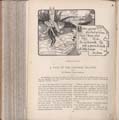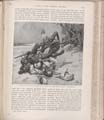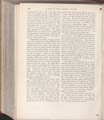
stnic.190403.001.001.jpg
A TALE OF THE CANNIBAL ISLANDS
The following is a true slory, and relates an experience of my father, the late William Stimson, who, at the time, was naturalist to the North Pacific Exploring Expedition, and who was later a member of the Natural Academy of Sciences.—AUTHOR.
IT was in the days when I was very young that I heard this tale told by my father. It wa during his last illness, as he sat propped up in his chair by the great pillars of the porch of our old place, Font Hill, amid the hills of Howard. When a young man he had seen strange things—wild men covered with paint, with spears in their hands, who ate one another, and great snakes and beasts, and all the wonderful life of the South Pacific. That day he was talking to an old friend, and we children sat upon the step with wide-open eyes, listening to the tales o strange adventures of their youth.
"Tobacco certainly has its uses," said my father, as he lighted a cigar; "it saved my life once, and but for it, youngster," and he ran his hands through the curls upon my head, for I had taken my place by his side, "you would not be here to-day."
My father's friend smiled, and we who knew that a story was coming were eager at once for the tale.
"Tell us, father, tell us," I demanded eagerly, as we crowded close about his chair.
"It happened," said he, "upon our expedition to the Pacific. I was on the 'Vin

stnic.190403.001.002.jpgcennes' at the time, and we were returning from our
expedition to the North Pacific, stopping among the South Sea Islands to take
soundings and to make surveys. This experience was a great pleasure to me, as it
was the first time a naturalist had ever been in these regions, and[illustration - "'Then I felt a hand on my shoulder, and three of us went down
together.'"] every day I was collecting specimens which were new to the scientific
world and a great addition to our knowledge of the fauna of the Pacific. Every
time the commodore could spare a boat and a man or two, I would go ashore and
collect great numbers of specimens, bringing them back in bags and cans to be
sorted over and put in alcohol. You know that some of these South Sea Islands
are very beautiful, great mountains rising, as it were, out of the bosom of the
ocean and towering thousands of feet above in the clear blue sky. In the valleys
of the mountains and along the shores of the sea dwelt the South Sea Islanders.
The soil being extremely rich and furnishing great quantities of food, the
natives lived with little or no labor. And it is strange that these islands,
among the fairest upon the face of the earth, doing everything that nature could
do to make man happy, were the homes of the most savage members of the human
race—the abode of cannibals. We had often paid a visit of state to the
cannibal kings of the different islands, but we always had a sufficient force
with us to curb any desire on the part of our host to have us for his dinner.
Nearly every time I went on a collecting expedition, my brother officers would
laughingly tell me to beware of furnishing the

stnic.190403.001.003.jpgcannibals with a meal. But a day came when I was to be taught a lesson. One
afternoon I received permission from the commodore to go ashore to collect,
taking with me four sailors to carry my specimens and to row me. The place at
which we landed was in a small bay about two miles from where the Vincennes lay.
The whole place was very quiet, with not a sign of a native or a hut anywhere to
be seen; everything appeared to be deserted. The beach stretched away on either
hand for miles and lay glimmering in the bright sun, while the forest with its
dense green foliage came within a few feet of the water's edge.
"I immediately began my collecting, and was more than ordinarily successful, giving the more common specimens to the sailors to carry, and keeping the rare ones myself. Hour after hour went by, and we strayed farther and farther from the boat, until, looking at my watch, I found we had barely time left to reach the ship in time for supper. When we were within about five hundred yards of our boat, we were suddenly startled by a terrible yell, and glancing hurriedly around, we saw a dozen or more cannibals spring out of the woods, brandishing their war-clubs and spears. My sailors immediately dropped everything and started to run to the boat as fast as their legs could carry them. I, however, valued my specimens more highly, and though I did not want to be eaten by cannibals, neither did I wish to lose my treasures. So I followed as fast as possible, carrying my specimens with me.
"Those five hundred yards seemed as many miles, as the sailors got farther and farther away from me in front and the yells of the savages sounded nearer and nearer behind. Still I held on to my specimens, and ran as I had never run before. At four hundred yards a spear whizzed by me and stuck up in the beach some yards in advance. Nearer and nearer came the yells behind me. I could hear the sound of their feet upon the smooth sand of the beach as the savages came on. The mist swam before my eyes as I nearly flew over the ground, still clutching my beloved specimens. I could almost feel the breath of the nearest runner now, and the boat was three hundred yards away. Then I felt a hand on my shoulder, and three of us went down together, rolling over and over in the sand. The others, luckily for me, were a little farther behind. Two big fellows, frightful in their warpaint, with rings in their ears and noses, were on top of me in an instant, and I gave myself up for lost. Just then, like a flash, an idea came to me.
"I knew that these savages were passionately fond of tobacco. My right hand was still free, and I slipped it into my pocket and pulled out my pouch of smoking-tobacco. Then, exerting all of my strength, I threw it some twenty feet away. The savages saw me throw it, and from the label on the bag knew what it contained, as they had often traded for it with the passing ships. A yell, and the whole twelve made a jump for the tobacco; in an instant they were a mass of struggling, writhing, twisting, fighting men, each bent on securing the prize. I was on my feet in a second, and a moment later I was half-way to the boat.
"The sailors had reached the boat in safety, pushed it into the sea, and were about rowing away, having given me up for lost. But when they saw me break away, they rested on their oars, until, nearly dead with the loss of breath, I reached the boat and they pulled me on board. I was just in time, for the savages, having torn the tobacco-bag to pieces, looked around for me, and, seeing that I was escaping, started after us; but a shot from a gun we had in the boat brought their progress to a sudden stop. Within a short time we were on board the Vincennes, and, it is needless to say, we never went on shore after that unless we were heavily armed."
"Did you save your specimens, professor?" asked one of father's eager listeners.
"I left them with the tobacco; but the next day I found that the savages had taken off the bags, leaving the specimens in a pile on the shore, so I only had had a very bad fright, and I secured my treasures after all."